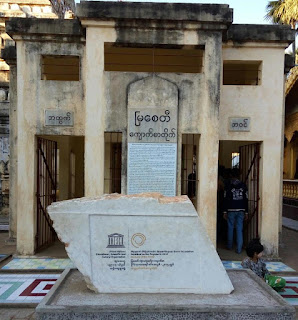2. Article (၃)
2. Article (3)
2.Non without “ The”
(1) တစ်ဦးဆိုင်နာမ်
(Proper Noun) များ၊ စိတ္တဇနာမ် (Abstract Noun) များနှင့် ရေတွက်မရသည့်နာမ် (Uncountable
Noun) များ၏ ရှေ့တွင် “ The ” မသုံးရပါ။
Eg: Kaung Zayar Linn,
Myanmar, Courage, Wisdom, Milk, etc …
*** နိုင်ငံသည် ကျယ်ဝန်းပြီး အများကိန်းနှင့်နိုင်ငံများဖြစ်လျှင်၊ တိုင်းပြည်အမည် ဒေသအမည်များတွင် (Republic) သမ္မတနိုင်ငံ၊ (Kingdom) ဘုရင့်နိုင်ငံ၊ (States) ပြည်နယ်များ၊ (Union, United) ပြည်ထောင်စု စသည်ဖြင့်ပါလျှင် “ The ” ထည့်သုံးသည်။
Eg: The USA, The UK, The
U.A.E
The United State of
America (The USA)
The United Kingdom (The
UK)
The Dominican Republic
The Republic of the Union
of Myanmar
(1) I’ve never been to
Japan. (ကျွန်တော် ဂျပန် မရောက်ဖူးဘူး။)
(2) I live in Myanmar. (ကျွန်တော်
မြန်မာပြည်မှာ နေတာ။)
(2) ကျယ်ဝန်းသော အမျိုးအစားပြ
နာမ်များ၏ရှေ့တွင် “ The ” မသုံးရပါ။
Eg: (1) Man is mortal.
(2) Rice is grown in
Myanmar,
(3) Gold is more expensive
silver.
(4) Houses are more than
expensive two years ago.
(3) ဘာသာစကားများ၏ရှေ့တွင်
“ The ” မသုံးရပါ။
*** “ The ” သုံးလျှင်
လူမျိုးကိုပြောခြင်း ဖြစ်သွားမည်။
Eg: Myanmar, English,
Chinese, French, Pali, etc …
Eg: (1) He has decided to
study Chemistry instead of Physics. (သူက ရူပဗေဒအစား ဓာတုဗေဒ သင်ယူဖို့ ဆုံးဖြတ်ခဲ့တယ်။)
(4) ပုံမှန်စားနေကျ
အစာများဖြစ်သည့် (Breakfast, Brunch, Lunch, Dinner) တို့၏ ရှေ့တွင်၊ အားကစားများဖြစ်သည့်
(Football, Basket-ball, Chess) တို့၏ ရှေ့တွင်၊ ဘာသာရပ်များဖြစ်သည့် (Physiscs,
Chemistry, Mathematics) တို့၏ ရှေ့တွင် “ The ” မသုံးရပါ။
*** အညွှန်းစကားလုံးပါလျှင်
“ The ” သုံးနိုင်သည်။
Eg: (1) I have dinner at 8 o’clock everyday. (ကျွန်တော် ညစာကို
ရှစ်နာရီမှာ နေ့တိုင်းစားတယ်။)
(2) The dinner I had
yesterday was good. (မနေ့က စားခဲ့သည့် ညစာဟု ရည်ညွှန်းလိုသဖြင့် The ထည့်သုံးသည်။)
(3) Breakfast starts at
seven. (နံနက်စာက ခုနစ်နာရီ စကျွေးမှာ။)
(4) The breakfast you
cooked yesterday was delicious. (မနေ့က မင်းချက်တဲ့ နံနက်စာ အရသာရှိတယ်။)
(5) I love Karate. (ကျွန်တော်
ကရာတေးကစားရတာ ကြိုက်တယ်။)
(6) I’m not keen on
caneball. (ကျွန်တော် ခြင်းလုံးကစားရတာကို စိတ်မဝင်စားဘူး။)
(7) He has decided to learn
Japan instead of English. (သူက အင်္ဂလိပ်စာအစား ဂျပန်ဘာသာ လေ့လာဖို့ ဆုံးဖြတ်ခဲ့တယ်။)
(8) Some
foreigner wants to learn Myanmar. (တချို့နိုင်ငံခြားသားတွေက မြန်မာစကား သင်ချင်ကြတယ်။)
(9) They speak Italian
and spanish. (သူတို့ အီတာလျံ(အီတလီ)စကားနဲ့ စပိန်စကား ပြောကြ တယ်။)
(10) Christmas is
celebrated in many countries. (ခရစ်စမတ်ပွဲကို တိုင်းပြည် တော်တော်များများ မှာ ကျင်းပကြပါတယ်။)
(5) နေ့စဉ်နှင့်အမျှ
သွားလာကြုံတွေ့နေရသည့် နေရာများကို မူလရည်ရွယ်ချက်နှင့် သွားခြင်းဖြစ်၍ မည်သည့် “
Article ” မျှမသုံးရပါ။
*** မူလရည်ရွယ်ချက်နှင့်
သွားခြင်းမဟုတ်လျှင် “ The ” ထည့်သုံးပေးရသည်။
Eg: Market, Home, Bed,
School, Church, Hospital, etc …
(1) I left my phone at
home.
(2) Kaung Kaung is
learning Karate at Asahi Karate Club.
(3) Kaung Zayar is a
student. He goes to school. (ကျောင်းသားမို့ ကျောင်းသွားလို့ the မထည့်ရပါ။)
(4) Daw Pyae Phyo San is
Kaung Zayar’s mother. Now she goes to the school. (ကျောင်းသား မဟုတ်၊ ဆရာမ မဟုတ်ဘဲ
တခြားကိစ္စနှင့် သွားခြင်းဖြစ်၍ school ရှေ့တွင် the ထည့်သည်။)
(5) Ngar is a rebel. Now
he is in prison. (သူပုန် ထောင်ကျလို့ prison ရှေ့မှာ the မထည့်ပါ။)
(6) Phoe Lone is Ngar’s
brother. He went to the prison to visit Ngar. (ထောင်ဝင်စာ သွားတွေ့ခြင်းသာဖြစ်၍
prison ရှေ့မှာ the ထည့်ခြင်း ဖြစ်သည်။)
(6) ဆွေမျိုးသားချင်း
အရင်းအချာကို ရည်ရွယ်ပြီးပြောလျှင် “ The ” မသုံးရပါ။
Eg: Father, Mother, Son,
Daughter, Brother, Uncle, Aunty, etc …
(1) Father will beat Ko
Kaung if he plays truant.
(2) Mother is cooking
dinner.
(3) Brother will play
when he come back.
(7) အခန်းနံပါတ်၊ လမ်းနံပါတ်၊
စာမျက်နှာနံပါတ်များနှင့် ပတ်သက်ပြီးပြောလျှင် “ The ” မသုံးရပါ။
Eg: Room 215, Room
No.(438), Page (36), Section A
(1) Our train leaves from
Platform 5. (the Platform 5 ဟု မသုံးရပါ။)
(2) They live at No.(9)
Pyone Yeik Tharyar Family, Kant Kaw Street, Bhone Soe Quarter, Monywa.
(8) ကုမ္ပဏီအမည်များရှေ့တွင်
“ The ” မသုံးရပါ။
Eg: (1) My brother got a
job in a Microsoft. (ကျွန်တော့်အစ်ကိုက မိုက်ကရိုဆော့ဖ် ကုမ္ပဏီမှာ အလုပ်ရတယ်။)
(2) Apple and Microsoft
are competitors. (Apple နဲ့ Microsoft က ပြိုင်ဘက်ကုမ္ပဏီတွေလေ။)
(9) လူ၊ တိရစ္ဆာန်နှင့်
အရာဝတ္ထုများအကြောင်း ယေဘူယျပြောလျှင် “ The ” မသုံးရပါ။
Eg: (1) Information is
money.
(2) I’m afraid of dogs. (ကျွန်တော်
ခွေးကြောက်တယ်။ dogs ရှေ့ the မထည့်ရပါ။ I’m afraid the dog near the door. တံခါးနားက
ခွေးကိုကြောက်တယ် စသည်ဖြင့် အတိအကျပြောမှ the ထည့်ရသည်။)
(3) I like strong black coffee. (ကော်ဖီပြင်းပြင်း ကြိုက်တယ်ဟု
ဆိုသော်လည်း ယေဘူယျသဘော ဆန်နေသဖြင့် the မထည့်ပါ။)
(4) Do you like the coffee we had after our meal last night? (မနေ့ညက
ထမင်းစားပြီးနောက် သောက်တဲ့ကော်ဖီဟု အတိအကျဆိုသဖြင့် the ထည့်သုံးသည်။)
(5) I like working with
people. (လူတွေနဲ့ အလုပ်လုပ်ရတာ ကြိုက်တယ်ဟု ယေဘူယျပြောသဖြင့် the မထည့်ရပါ။)
(6) I like the people I
work with. (ကျွန်တော်နဲ့ အလုပ်အတူလုပ်တဲ့သူတွေဟု အတိအကျ ပြောသဖြင့် the ထည့်သုံးသည်။)



Comments
Post a Comment